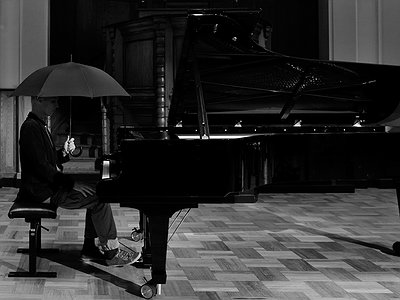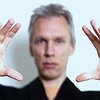Name: Reinier van Houdt
Nationality: Dutch
Occupation: Pianist, Composer
Musical Recommendations: Music: Tony Conrad: Slapping Pythagoras; Literature: Maurice Blanchot: Le très haut
Website / Contact: If you enjoyed this interview with Reinier van Houdt, visit his website for all the information you could possibly desire.
When did you start playing your instrument, and what or who were your early passions and influences? What what is about music and/or sound that drew you to it?
I started playing the piano around the age of ten. Parallel to learning harmonically complex pieces from Bach, Schumann, Chopin and Satie I soon discovered that I could also make my own sounds. Later I began to experiment with amplifiers, radio's, computers and cassette-recorders. Drawing unpredictable sounds from objects or randomly recording everyday situations opened my ears to sound itself, before it might get turned into 'music'.
Two things drew me to getting involved with music: on one side there was the psychic and physical high of playing music, and on the other this impersonal machinelike state of listening, as if channelling the sounds of existence.
For most artists, originality is first preceded by a phase of learning and, often, emulating others. What was this like for you? How would you describe your own development as an artist and the transition towards your own voice? What is the the relationship between copying, learning and your own creativity?
Originality is a confusing notion. It can't be measured by external differences. Different doesn't mean original, it somehow has to do with a deeper ability to convey an experience of being in a world.
Early on I realised that for me listening is the basis for making music, from the perspective of the musician as well as the composer. This seems tautological, but not when you realise there is already an imagination at work when you listen to sounds.
My development is marked by finding ways to conjugate 'found' sounds, sounds that are simply out there somewhere, into music; from developing alternative notations, structures and forms, to finding compositional paths to channel all the scattered experiences and intuitions about life into music. All in all a personal process for which learning & copying is of little use. I was so lucky to have met Robert Ashley, who urged me "don't let anybody ever tell you that you've got nothing" and that always stuck with me. Of course there are ideas that bring people together but where creativity is concerned you really have to stay true to yourself and to what comes out of you. What works for one person ultimately doesn't work for another. Even asking just one person about method is like asking a centipede how he walks.
What were some of your main artistic challenges when starting out as an artist and in which way have they changed over the years?
The first challenge was to leave conventional notation behind, because it didn't work for the music I was trying to imagine. I forgot about notation for a while and I only experimented and recorded things, studied open scores by people like Cage, Cardew, Wolff or Fluxus-related artists. Ultimately a notation developed on equal pace with the real challenge of making music from found sounds or from a contingent situation. It touched on new concepts of time and structure in music and it opened so many more paths to explore. "There's mysticism every time we fail to repeat ourselves" Paul Valéry once said. For me that meant that I am bound to start from scratch with each new piece.
Tell us about your studio/work space, please. What were criteria when setting it up and how does this environment influence the creative process? How important, relatively speaking, are factors like mood, ergonomics, haptics and technology for you?
In the end all this doesn't matter. For me the question almost suggests that music is simply a job, where for me it's a way of life. As a musician I'm more or less permanently in survival-mode and that is my only criterion for a studio: I am where I can afford to be and I work with whatever's available. Each situation brings its own set of contingencies which activate a different part of your creativity.
Tell me about your instrument, please. What was your first instrument like and how did you progress to your current one? How would you describe the relationship with it? What are its most important qualities and how do they influence the musical results, including your own performance?
The piano is an enigmatic instrument: standardization and the calibration of differences seem possible, but the secret of making music on it lies at the point where you find out it isn't possible at all.
It's not about intentions or serialised intensities, but about working with creating differences, nuances and deviations. Often these happen by chance and you develop an extreme versatility to work with it in the moment they come out. Your limbic system seems to latch on to these.
Studying a piece for me means exploring the territory and its possibilities, getting an idea of possible paths. Performing it is to go on the journey. This also applied when later on I started playing synthesizers: I used these not so much for their standardized presets but for brewing my own patches on it, and often I made them do things for which they weren't made
Could you take us through a day in your life, from a possible morning routine through to your work? Do you have a fixed schedule? How do music and other aspects of your life feed back into each other - do you separate them or instead try to make them blend seamlessly?
There is no fixed schedule that I can afford. Things are contingent, connected, blended and feeding back into each other, simply because they all converge in me making the music, whether I want that or not.
Could you describe your creative process on the basis of a piece or album that's particularly dear to you, please? Where did the ideas come from, how were they transformed in your mind, what did you start with and how do you refine these beginnings into the finished work of art?
I often record sounds and then listen to them again. This listening process, the differences and phantom-sounds it brings to the surface, is the basis for a lot of the work. As an example there is a piece on my last album PATHS OF THE ERRANT GAZE called "Atopic Radio". It uses a series of shortwave-recordings I collected or made myself over the years: a lot of numberstations and a collection of static noise with soft music shimmering through it. I composed a piece with these by listening for pulses, waves and drones, orchestrating them , and combining the series of numbers with an online computer-voice calling out numbers in a mathematical game.
I started this process with the strange realisation that I could remember numbers more easily than words, happenings in my life and their timelines. I think this has to do with the nature of experience: you're embedded in it, there are emotional and affective connections that you can't objectify; numbers however are a world in itself and are in a way self-referential. I wanted to bring the fascination for numbers together with this being consumed by experience in a piece that is situated in the typical ghostly realm of the radio, with its thick atmosphere and worlds beyond.



